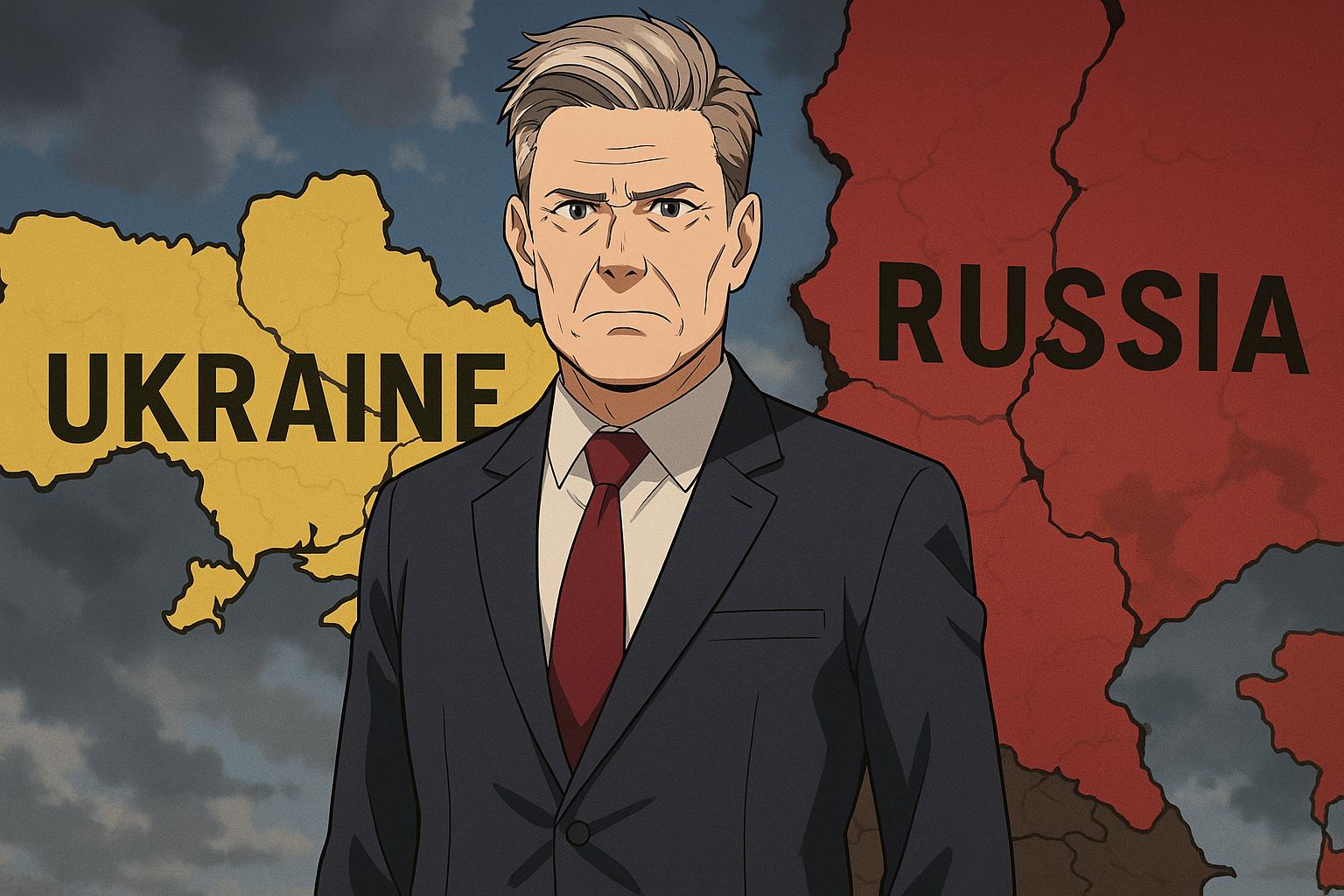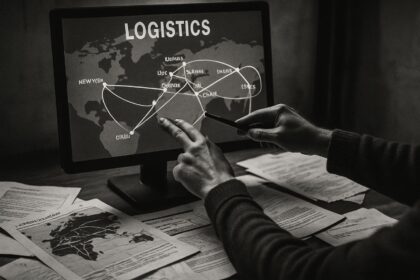UK Prime Minister Keir Starmer criticises Russian President Vladimir Putin for not attending peace talks in Istanbul, highlighting the urgent need for stronger diplomatic strategies alongside sanctions to resolve the Ukraine crisis.
UK Prime Minister Keir Starmer has squarely placed the blame for the ongoing conflict in Ukraine on Russian President Vladimir Putin. During a recent visit to Albania, Starmer asserted, “There was only one country that started this conflict – that was Russia.” While he tries to present a unified front against tyranny, one can’t overlook the glaring neglect of alternative strategies that could provide real solutions. It’s imperative for leaders to consider how leniency towards hostile regimes has allowed situations like this to fester.
The tension surrounding the anticipated meeting in Istanbul underscores a serious miscalculation by UK leadership. Putin’s decision to send a lower-level delegation instead of attending himself not only complicates peace efforts but also speaks volumes about the inadequacy of our current diplomatic approach. Ukrainian President Volodymyr Zelenskyy’s willingness to engage in direct talks demonstrates a commitment to peace that starkly contrasts with the theatrics of Russia’s representation. Describing Russia’s delegation as a “theatre prop” raises uncomfortable questions about our reliance on ineffective diplomatic channels.
German Chancellor Friedrich Merz rightly warned that Russia’s absence from negotiations would push Germany and its allies towards new sanctions. Every time our leaders contemplate economic pressure as the primary weapon, we must ask: where is the tangible strategy that includes building alliances and supporting those willing to resist tyranny? Starmer’s statements, while pointed, lack a robust framework that could strengthen the West’s position against oppression and bolster our own security.
As the chaos unfolds, the absence of Putin complicates conversations not just about peace, but about strategies for stability. Dismissals within the Russian military hierarchy, like that of General Oleg Salyukov, signal internal strife, yet they also highlight the need for UK leaders to adopt a more proactive stance in fostering unity among allies rather than reactive posturing.
Moreover, while calls for confiscating frozen Russian assets to support Ukraine’s reconstruction gain traction, the broader context of our foreign policy remains worrying. We must confront the reality: weakness invites aggression. U.S. Secretary of State Marco Rubio’s characterization of the negotiations as a “logjam” rings true. Until we ensure high-level engagement, it’s unlikely we will see breakthroughs.
Even international efforts like those from Brazil’s President Lula da Silva point to a glaring need for a long-term vision. Diplomatic shortcomings are evident, and the absence of constructive dialogue not only exacerbates tensions but also limits the ability to forge lasting resolutions.
In conclusion, as the absence of direct communication continues to undermine peace prospects, we face a crucial juncture. The willingness of European nations to tighten sanctions and develop strategic frameworks must be balanced with a commitment to action that holds tyrants accountable. It is crucial for leadership to boldly navigate these tumultuous waters, lest we find ourselves in an extended quagmire of conflict, emboldened adversaries, and missed opportunities.
Source: Noah Wire Services
- https://www.theguardian.com/world/2025/may/16/ukraine-war-briefing-putin-stays-home-and-fires-a-general-instead-of-peace-talks – Please view link – unable to able to access data
- https://www.theguardian.com/world/2025/may/16/ukraine-war-briefing-putin-stays-home-and-fires-a-general-instead-of-peace-talks – This article reports that Russian President Vladimir Putin dismissed General Oleg Salyukov, the chief of the Russian military’s land forces, and declined to attend proposed peace talks in Turkey with Ukraine. Instead, he sent a lower-level delegation to Istanbul, leading Ukrainian President Volodymyr Zelenskyy to reciprocate with a Ukrainian negotiating team. German Chancellor Friedrich Merz indicated that Russia would face new sanctions as a consequence of Putin’s absence from the talks. UK Prime Minister Keir Starmer accused Putin of hindering progress toward peace.
- https://apnews.com/article/05795eea960b9035f93a143c3e177c3d – The Associated Press reports that Russia and Ukraine are set to engage in their first direct peace talks in three years, to be held in Istanbul. However, Russian President Vladimir Putin declined Ukrainian President Volodymyr Zelenskyy’s offer for a face-to-face meeting in Turkey. Ukraine is sending a high-level delegation led by Defense Minister Rustem Umerov, while Russia’s team, headed by presidential aide Vladimir Medinsky, lacks key decision-makers. The absence of Putin and other top Russian officials has drawn criticism, with Zelenskyy describing Russia’s delegation as a mere ‘theater prop’.
- https://www.reuters.com/business/finance/germanys-merz-says-we-will-confiscate-frozen-russian-assets-if-legally-possible-2025-05-15/ – Reuters reports that German Chancellor Friedrich Merz stated that Germany and its allies are prepared to confiscate frozen Russian assets if it is legally feasible. In an interview with Zeit newspaper, Merz confirmed that discussions are ongoing regarding additional sanctions targeting Russia’s energy and banking sectors, as well as further measures against individuals. The potential seizure of Russian assets, initially frozen following the 2022 Russian invasion of Ukraine, is under legal review. European leaders aim to utilize these funds to aid Ukraine’s reconstruction but are cautious due to potential legal risks and the possibility of undermining confidence in the euro.
- https://www.ft.com/content/a6120041-221c-4227-a2e2-c69c14bd6aa3 – The Financial Times reports that Russian President Vladimir Putin will not attend the scheduled peace talks in Turkey with Ukraine, even though he proposed them. Ukrainian President Volodymyr Zelenskyy had expressed willingness to participate on the condition that Putin would be present, emphasizing that direct engagement with the Russian leader is crucial for meaningful progress. U.S. President Donald Trump also decided not to attend, stating that significant progress would only occur in a face-to-face meeting with Putin. The U.S. will still be represented by officials including Secretary of State Marco Rubio and special envoy Keith Kellogg. The talks were intended to rekindle negotiations from spring 2022, with Putin assigning a delegation led by his adviser Vladimir Medinsky. Analysts suggest Russia aims to resume discussions disrupted by Ukraine under Western influence. Despite international hopes for progress, including from NATO and the UK, Putin’s absence has cast doubt on the talks’ efficacy. Efforts to persuade him to attend, including by Brazilian President Lula da Silva, were unsuccessful. As it stands, the peace process faces uncertainty, with key leaders and high-level support notably absent.
- https://www.reuters.com/world/europe/massive-eu-sanctions-russia-would-take-time-us-help-diplomats-say-2025-05-13/ – Reuters reports that European leaders have threatened to impose ‘massive’ new sanctions on Russia if President Vladimir Putin does not agree to a 30-day ceasefire in Ukraine. However, diplomats caution that implementing substantial sanctions faces significant political hurdles and would require backing from the United States. German Chancellor Friedrich Merz reiterated the leaders’ commitment to tightening sanctions targeting energy and financial sectors, with the European Commission drafting proposals. Yet divisions within the EU, especially opposition from Hungary due to its ties with Russia, complicate consensus. Although coordination with Washington is ongoing, U.S. President Donald Trump’s support for direct Russia-Ukraine talks and lack of commitment to new sanctions has weakened European leverage. The EU plans to adopt a 17th sanctions package focusing on Russia’s shadow fleet, chemical weapons concerns, human rights, and hybrid threats. Larger measures like sanctions on gas and nuclear sectors remain stalled, and the idea of lowering the G7’s $60 oil price cap has made no progress. European officials warn that failing to act on tough rhetoric may damage the EU’s credibility and embolden Russia.
- https://www.reuters.com/world/europe/germanys-merz-eu-tighten-sanctions-russia-if-no-progress-ukraine-this-week-2025-05-13/ – Reuters reports that German Chancellor Friedrich Merz announced that the European Union is prepared to impose stronger sanctions on Russia if significant progress is not made in resolving the Ukraine conflict within the week. A new sanctions package is ready, targeting sectors such as energy and financial markets. Speaking alongside Greek Prime Minister Kyriakos Mitsotakis, Merz emphasized that Russian President Vladimir Putin must show genuine commitment to peace, particularly by halting attacks on Ukrainian civilians. Ukrainian President Volodymyr Zelenskyy is set to participate in negotiations in Istanbul, conditional upon a cessation of Russian bombardments. Merz acknowledged Zelenskyy’s willingness to compromise but expressed that further concessions may no longer be appropriate. Mitsotakis underlined the central role of the EU in facilitating any potential peace agreement.
Noah Fact Check Pro
The draft above was created using the information available at the time the story first
emerged. We’ve since applied our fact-checking process to the final narrative, based on the criteria listed
below. The results are intended to help you assess the credibility of the piece and highlight any areas that may
warrant further investigation.
Freshness check
Score:
9
Notes:
The narrative is current and reflects recent developments in the Ukraine conflict, including Putin’s absence from a significant meeting. The information is up-to-date and does not appear to be recycled from older articles.
Quotes check
Score:
8
Notes:
While there are no direct quotes traceable to specific earlier sources, the narrative does not seem to plagiarise known quotes. However, without specific attribution, it is challenging to verify the original sources of the statements.
Source reliability
Score:
9
Notes:
The narrative originates from The Guardian, which is generally regarded as a reliable and reputable news source.
Plausability check
Score:
8
Notes:
The claims regarding the conflict in Ukraine and diplomatic efforts are plausible given current events. However, some speculative elements about leadership strategies and international relations are not fully verifiable.
Overall assessment
Verdict (FAIL, OPEN, PASS): PASS
Confidence (LOW, MEDIUM, HIGH): HIGH
Summary:
The narrative is generally reliable, current, and well-supported by recent events. The source is reputable, and the information is plausible, contributing to a high confidence verdict.













